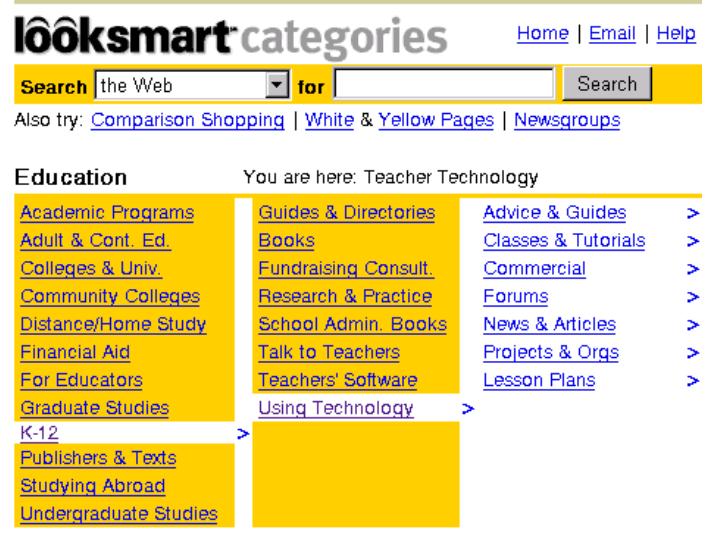Finding Things in the Internet
There are different kinds of search tools in the Internet. No matter how
sophisticated or efficient their robots are, it is not wise to rely on
one search engine or directory to do all searches for you. Like any other
regular tool that you use to repair cars, you will find different tools
are designed for different functions. Understanding how each search tool
works will significantly cut down your search time. It will also improve
the quality of information gathered.
Subject Directories
Also called indexes, directories like Yahoo, Magellan, Lycos, Galaxy, and
LookSmart organize sites in heirarchies by subject categories. Lycos, for
example, organizes its index in alphabetical order from "Arts & Entertainment"
to "Travel." Browsing the Web using directories is a form of subject-oriented
searching because you are researching by topic.
Here's another example:
Galaxy Home > Social Sciences > Education
> K-12 > Teaching and Learning > Teacher Resources > Lesson Plans > Welcome
to the Lesson Plans Page
Here's another example:

You can see from these examples that one disadvantage of directories is
that you have to go through several layers before you get to a specific
web page. Their advantage is a fair amount of human intervention that is
involved in organizing the directories. Website owners can submit their
sites for inclusion in the category they best fit, editors review these
sites to check if these belong to the proper categories, and occasionally,
they handpick top choices as "sites of the day."
Search Engines
When you use search engines like Alta Vista, HotBot, and Google, you are
not searching the Web but in fact searching databases compiled and indexed
by robots. Text searching is usually done using keywords which are matched
against the databases' indices. Because the sites are collected by robots
regardless of whether these were submitted or not, these databases are
usually large and comprehensive. The disadvantage here is you can be inundated
by a million matches if you use broad words. For example, a search in Infoseek
for "search engine tutorial" produced 10,166,504 matches! The first and
third items in this list are the same tutorial software to help webmasters
fine-tune the meta tags of their web pages:
Search
Engine Tutorial: Meta Medic
Meta
Medic freeware from Northern Webs is a combination Web spider and syntax
checker which will generate a report on use of meta tags at a particular
URL.
Relevance:
100% Date: 19 Aug 1999, Size 18.2K, http://www.northernwebs.com/set/setsimjr.html
Find
similar pages | More results from www.northernwebs.com
| Translate this page
The advantage of this format it is very informative. It gives the relevance
of the page, the date when the page was last updated, the size, URL (other
search engines don't), and link options for similar pages, etc.
Excite uses concept searching which analyzes the context or theme of
the bunches of words entered. Although the first item was rated only 77
percent in terms of relevance, it was closer to the topic I have in mind:
77
% Web
Search Strategies - A free, interactive tutorial on how to search the
Internet using basic and advanced search techniques. http://home.sprintmail.com/~debflanagan/main.html
Search
for more documents like this one
Excite offers other options. You can view the results by title, by websites,
summaries, publication, and by date. It also provides recommended sites
from its own directory. This is the second item on this short list and
in turn -- because it's a directory -- leads you to another list arranged
by websites, message boards, and clubs:
Computers
& Internet > Internet > Getting Started
Includes:
For first-time users of the Internet, a glossary of useful terms, guide
to Netscape, and other hints and tips.
Meta-Search Engines
Meta-search engines are multiple-search tools which look across the databases
of several search engines and combines all results in one page. The most
popular ones are Dogpile, Metacrawler, and Ixquick.
Their
advantage is you can get search results faster from more than one search
engine. The library of the University
of California, Berkeley has this to say about meta-search engines:
Meta-Search Engines quickly and superficially
search several individual search engines at once and return results compiled
into a sometimes convenient format. CAVEAT: They only catch about 10% of
search results in any of the search engines they visit.
"Important
Things to Know Before You Begin Searching the Web"
UC Berkeley Teaching Library Internet Tutorial
Recommended reading:
|



